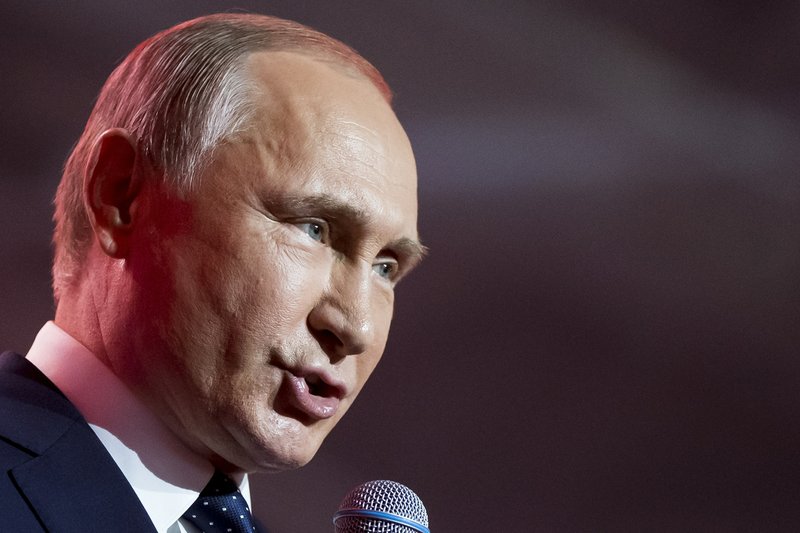MOSCOW -- President Vladimir Putin has urged Russians to cast ballots in Sunday's election, saying the vote will shape the country's future.
In a televised address Friday, Putin said "the will of the people, the will of each Russian citizen will determine the path the country will take." But the Russian leader, whose approval ratings top 80 percent, is set to easily win another six-year term against seven challengers.
The Kremlin is concerned about voter apathy and has sought to boost turnout to make Putin's victory as impressive as possible.
Putin urged Russians to "use their right to choose the future for the great Russia that we all love." He warned that failure to cast a ballot would mean that "this decisive choice will be made without your opinion taken into account."
On Friday, the final day of the campaign, he visited a medical center in St. Petersburg, his home city, promising to modernize the health care system.
The president has traveled across Russia, pledging to raise wages, pour more funds into crumbling health care and education and modernize dilapidated infrastructure.
He also has appealed to national pride, pointing at Western sanctions against Russia as a proof of efforts by the U.S. and its allies to isolate and weaken Russia.
In a state-of-the-nation speech earlier this month, Putin said Russia has tested an array of new nuclear weapons that are impossible to intercept. He invited Russians to join an online contest for the best name for some of the weapons, a competition that drew hundreds of thousands of proposals.
The presidential vote was set on the anniversary of Russia's 2014 annexation of Crimea from Ukraine, which significantly bolstered Putin's popularity. Polls show that most Russians continue to see the takeover of Crimea as a major achievement despite the subsequent Western sanctions that contributed to a two-year recession.
"While the emotional effect from taking over Crimea is over ... it has continued to serve as a basis for uniting most Russians," said Andrei Kolesnikov, an analyst with the Carnegie Moscow Center. "People support Putin as a symbol of Russia, symbol of its might."
Russia and Ukraine have remained in a tug-of-war over Crimea's annexation and Moscow's support for separatist insurgents in eastern Ukraine.
Ukraine's Interior Minister Arsen Avakov declared Friday that Russian citizens in Ukraine won't be allowed to vote at polling stations in the Russian Embassy and consulates.
Avakov pointed to the Russian annexation of Crimea and its support for the rebels in eastern Ukraine as reasons behind the decision. Russian election officials called the move a violation of international law.
In Moscow, Ksenia Sobchak, a 36-year-old TV host who has campaigned on a liberal platform and criticized Putin's policies, announced the creation of a new political party late Thursday.
Addressing an enthusiastic crowd of mostly young supporters, Sobchak said the Party of Change that she will lead together with former lawmaker Dmitry Gudkov would seek to unite pro-overhaul forces. "We stand for a broad coalition of democratic forces," she said.
Some see Sobchak, the daughter of Putin's one-time patron, as a Kremlin project intended to add a democratic veneer to the vote and help split the ranks of Kremlin critics.
Sobchak has denied collusion with the Kremlin and said she was ready to cooperate with Putin's main foe, opposition leader Alexei Navalny, who was barred from the race because of a criminal conviction widely seen as politically motivated.
"He should understand that we are working for the same thing," Sobchak said. "And now is not the time to bear personal grudges against me instead of the government."
Navalny has called for boycotting the vote. In a YouTube video aired late Thursday, he mocked Sobchak and other candidates, describing them as "clowns" manipulated by the Kremlin, and called on his supporters to press for change by taking to the streets.
A Section on 03/17/2018
